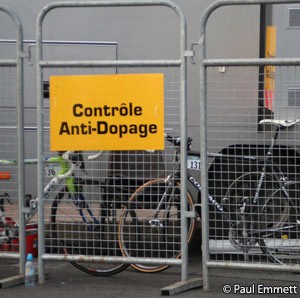New Association of Professional Cyclists president says only the cyclists pay for doping
 Former Italian professional Gianni Bugno criticised the International Cycling Union (UCI) today in an interview with his country’s leading sports newspaper, La Gazzetta dello Sport. After eight months as president of the Association of Professional Cyclists (CPA), he explained that there is a lot to be changed, starting with the UCI.
Former Italian professional Gianni Bugno criticised the International Cycling Union (UCI) today in an interview with his country’s leading sports newspaper, La Gazzetta dello Sport. After eight months as president of the Association of Professional Cyclists (CPA), he explained that there is a lot to be changed, starting with the UCI.
“It is not easy to interact with the riders, the organisers and the UCI,” said Bugno. “The group [of riders] is in continuous change. Inside, there are at least three divisions: the top cyclists, who act on their own, those who are pro’ for only a couple of seasons and the warriors that ride for years. Among these three groups there is not cohesion.”
Bugno won the World Championships twice and the Giro d’Italia. With his experiences, he is working with the cyclists and pushing for changes in the UCI’s rules. He will likely meet with the UCI at the end of this month regarding its biological passport anti-doping programme.
“There needs to be changes in how it [the biological passport] is managed and how it is carried out,” he continued. “As it stands now, it gives no guarantees to anyone.”
The biological passport offers a way to signal doping without a traditional positive test. Scientists can plot blood and urine readings over time to be able to recognise irregularities.
On May 3, the UCI caught Italian cyclist Franco Pellizotti with the biological passport. The Italian Olympic Committee (CONI) reviewed the case and recommended a two-year suspension to the Italian anti-doping tribunal (TNA) on July 29. However, the TNA acquitted Pellizotti on October 21 because there was not “a sufficient level of certainty.”
The UCI is expected to appeal the decision to the Court of Arbitration for Sport (CAS). Pellizotti, 32, was prevented from racing the Giro d’Italia in May and has not raced officially since. His rumoured to be ready to sign with Spain’s first division team, Movistar, but it has not yet announced a contract.
“Pellizotti is paying for the war he had and won against the UCI’s biological passport,” Bugno said. “The teams are not signing him because they are afraid of blackmail.”
He also blamed the UCI’s for Alberto Contador’s case. The Spaniard won the Tour de France for a third time in July, but two months later, it was revealed he tested positive for Clenbuterol at the race. The UCI turned its investigation files over to the Spanish national federation officials, who are investigating the case.
Contador maintains his innocence, saying the drug came from eating a contaminated steak, but risks a two-year suspension and loss of his third Tour win. Bugno believes Contador’s defence.
“I believe in him. But it’s an absurd situation. The new season is starting and we still do not know who won the last Tour. We are back to square one: the UCI’s rules as they are, are not working well,” he said.
“The teams should also be held responsible in doping cases. One [doping] case, though it should not, could go unpunished. With the second, you’re [the team] punished and maybe with the third, you stop or are knocked down a division.”
Bugno tested positive for caffeine in 1994 and served a three-month suspension. In a police investigation of Doctor Francesco Conconi in 1998, Bugno was listed as one of several cyclists who Conconi treated with blood booster EPO.